Resource(s) available in Nicaragua Revolution: David Schwartz Collection's collection
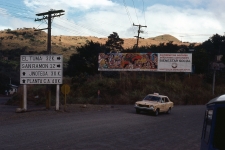
Nicaraguan Billboard: "A problemas sociales soluciones comunales"
The billboard reads: "A problemas sociales soluciones comunales. Bienestar social. Miniesterio de bienestar social. A satisfechar a las necesidades basicas a traves del trabajo productivo y organizado por compartiendo los logros sociales." The English translation is "For social problems communal solutions. Ministry of Social Welfare. To meet basic needs through productive work organized by sharing social achievements." At the left corner of the image, there is a sign of cities in Nicaragua, including El Tuma, San Ramón, Jinotega, and Planta C.A." Archived by Leah Williams. Photographed by Professor David Schwartz, Albright College, 1981.
David Schwartz Collection, Albright College
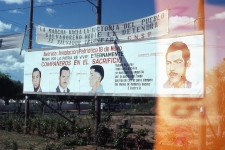
Nicaraguan Billboard: "Compañeros en el sacrificio"
The sign above the billboard reads: "La marcha hacia la victoria del pueblo nadie la detendra El Salvador triunfara. C. N. S. P." The billboard reads: "Avenida: Inmolacion Patriotica 18 de Mayo. Morir por la patria, es vivir : eternamente. Compañeros en el sacrificio." Below are four names and images of men, including Edwin Castro Rodríguez, Ausberto Narváez Parajón, Cornelio Silva Argüello, Rigoberto López Pérez. The first three men were assassinated in prison by the Somoza regime for their participation in the Sept. 21, 1956 bombing. Here is a newspaper article from El Nuevo Diario covering their deaths: http://www.elnuevodiario.com.ni/especiales/74502-dia-hienas-carceles-aviacion/ Rigoberto López Pérez was a Nicaraguan poet, artist, and writer who assassinated President Anastasio "Tacho" Somoza García in the Sept. 21, 1956 bombing but was instantly killed afterward. Somoza's son, Luis Somoza Debayle, became president shortly after. To the right of the men is a quote by Edwin Castro Rodríguez: "Mañana hijo mio todo sera distinto se marchará la angustia por la puerta del Fondo que han de cerrar para siempre las manos de hombres nuevos." The English translation is: "Tomorrow, my son, everything will be different, anguish is going through the back door, which the hands of new men will close forever." Archived by Leah Williams. Photographed by Professor David Schwartz, Albright College, 1981.
David Schwartz Collection, Albright College
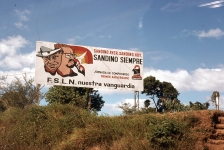
Nicaraguan Billboard: Augusto Sandino and Carlos Fonseca, FSLN
The billboard reads: "Sandino ayer, Sandino hoy, Sandino siempre. Jornada de compromiso primer aniversario F.S.L.N. nuestra vanguardia." The English translation is "Sandino yesterday, Sandino today, Sandino always. First Anniversary Engagement Day F.S.L.N. Our forefront." Augusto Sandino, Nicaraguan revolutionary leader is pictured left, and Carlos Fonseca, founder of the leftist political party FSLN is pictured right. Archived by Leah Williams. Photographed by Professor David Schwartz, Albright College, 1981.
David Schwartz Collection, Albright College
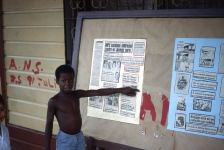
Nicaraguan Boy Pointing to Newspaper Clippings
A Nicaraguan boy is seen pointing to newspaper clippings with headlines such as: "MPS combaten infiltracion contra en Jinotega norte," which translates to MPS combat infiltration against in Jinotega north and "Reagan esta en un callejon sin salida," which in English translates to "Reagan is on a dead end street." Archived by Leah Williams. Photographed by Professor David Schwartz, Albright College, 1981.
David Schwartz Collection, Albright College

Nicaraguan Boy Standing Against Stone Wall
Pictured is a Nicaraguan boy standing against a stone wall. Archived by Leah Williams. Photographed by Professor David Schwartz, Albright College, 1984.
David Schwartz Collection, Albright College
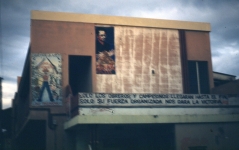
Nicaraguan Building with Augusto Sandino Quote
A poster on the building contains the quote often quoted by Augusto Sandino in Nicaraguan political billboards and art: "Solo los obreros y campesinos llegaran hasta el fin, solo su fuerza organizada nos dara la victoria." The English translation is "Only the workers and peasants will last until the end, only your organized strength will give us the victory." The building contains two additional posters. One appears to be a portrait of Carlos Fonseca, founder of FSLN. Another, which may be a representation of Augusto Sandino as the trademark sombrero indicates, pictures a man holding two rifles surrounded by words that are not entirely clear. Archived by Leah Williams. Photographed by Professor David Schwartz, Albright College, 1984.
David Schwartz Collection, Albright College
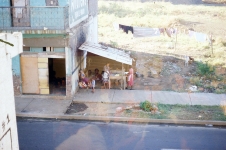
Nicaraguan Family outside Their Home
Pictured is what appears to be a family outside their home in Nicaragua. The family appears to be preparing food and is outside along with animals and laundry. The town remains unidentified. Archived by Leah Williams. Photographed by Professor David Schwartz, Albright College, 1984.
David Schwartz Collection, Albright College
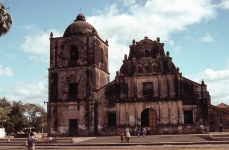
Nicaraguan Historic Cathedral
The historic building appears to be a cathedral. It is visually similar to the Cathedral of León, though the cathedral pictured remains unidentified. Archived by Leah Williams. Photographed by Professor David Schwartz, Albright College, 1984.
David Schwartz Collection, Albright College
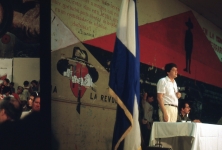
Nicaraguan man speaking in front of Sandinista flag, revolutionary wall art
A man is speaking in what appears to be a lecture hall in Nicaragua. An image of Nicaraguan revolutionary Augusto Sandino and a Sandinista flag is in the background. People can be seen gathered in the hall. Archived by Leah Williams. Photographed by Professor David Schwartz, Albright College, 1984.
David Schwartz Collection, Albright College
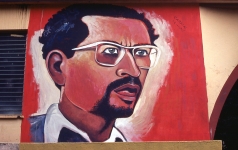
Nicaraguan Mural of Carlos Fonseca
Pictured in the mural is a portrait of Carlos Fonseca, founder of FSLN the leftist political party in Nicaragua. The mural is signed "Caracas," and the artist is implied to be César Caracas, Nicaraguan artist who painted during the Nicaraguan revolution. Archived by Leah Williams. Photographed by Professor David Schwartz, Albright College, 1981.
David Schwartz Collection, Albright College
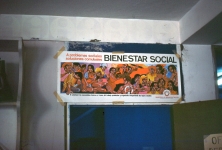
Nicaraguan Poster: "A problemas sociales soluciones comunales"
The poster reads: "A problemas sociales soluciones comunales. Bienestar social. A satisfechar a las necesidades basicas a traves del trabajo productivo y organizado por compartiendo los logros sociales." The English translation is "For social problems communal solutions. Social welfare. To meet basic needs through productive work organized by sharing social achievements." Archived by Leah Williams. Photographed by Professor David Schwartz, Albright College, 1981.
David Schwartz Collection, Albright College
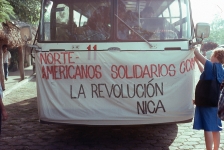
Nicaraguan Poster: "Norte-americanos solidarios con la revolución nica"
The poster, which appears to be attached to a public transportation bus, reads: "Norte-americanos solidarios con la revolución nica." The English translation is "North Americans in solidarity with the Nicaraguan revolution." Archived by Leah Williams. Photographed by Professor David Schwartz, Albright College, 1981.
David Schwartz Collection, Albright College
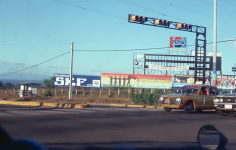
Nicaraguan Street View with Political Billboards
1980s Nicaraguan street view with political billboards. The middle billboard reads: "La Policia Sandinista: de la mano con los obreros y campesinos." The English translation is "The Sandinista Police: On the side of the workers and peasants." Archived by Leah Williams. Photographed by Professor David Schwartz, Albright College, 1981.
David Schwartz Collection, Albright College
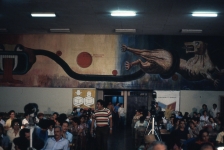
Painting in Lecture Room
People are gathered in what appears to be a lecture room. A painting of shapes, a snake, and a dog contains the phrase: "nosotros iremos hacia el sol deja libertad." In English, this reads "we will go toward the sun leaving freedom." An additional image shows a man with a sombrero (iconic for Ncaraguan revolutionary leader Augusto Sandino) and a woman reading a book. Another image contains a book and states: "Alfabetizacion es liberacion." Cameras appear to be set up at the event. Archived by Leah Williams. Photographed by Professor David Schwartz, Albright College, 1984.
David Schwartz Collection, Albright College
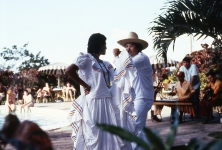
People Dancing
Two people dressed in white with red and blue stitching are dancing outside. One man is wearing a sombrero. Archive by Leah Williams. Photographed by David Schwartz, Albright College, 1984.
David Schwartz Collection, Albright College
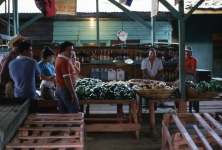
People in front of Food Market, FSLN Flag in Background
People are pictured in front of a food market. In the background is a black and red FSLN flag. Archived by Leah Williams. Photographed by David Schwartz, Albright College, 1984.
David Schwartz Collection, Albright College
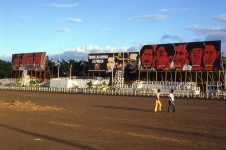
Political Billboards: "Todas las armas al pueblo"
Several political billboards are pictured. The center reads: "Todas las armas al pueblo," or in English, "All weapons to the people." The billboard pictured to the right contains images of five men: Jose Benito Escobar, Jorge Navarro, Pablo Ubeda, German Pomares, and Faustino Ruiz. All of these men held ranks in the Frente Sandinista de Liberación Nacional (FSLN). The names of the men on the farther billboard are unidentifiable. Archived by Leah Williams. Photographed by David Schwartz, Albright College, 1984.
David Schwartz Collection, Albright College
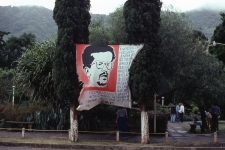
Poster of Carlos Fonseca, Call to Youth
Political poster in trees with Carlos Fonseca begins with: "Invito a los núcleos juvenilies..." Though the entirety of the poster is unclear, the poster appears to make a call for youth to join together during the revolution. Archived by Leah Williams. Photographed by Professor David Schwartz, Albright College, 1981.
David Schwartz Collection, Albright College
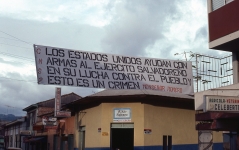
Quote from Monseñor Óscar Romero on U.S. Weapon Assistance to Salvadoran Army (1/2)
"Los Estados Unidos ayudan con armas al ejercito Salvadoreño en su lucha contra el pueblo y esto es un crimen" ~Monseñor Romero. In English, the quote reads "The United States helps the Salvadoran army with arms in its fight against the people, and this is a crime." Monseñor Óscar Romero served as Roman Catholic Archbishop of San Salvador and spoke out against social injustice and violence by the government and encouraged his people to stop carrying out government orders to kill. He was shot and killed while celebrating mass. To the left of the quote is the acronym C. N. S. P., which stands for Consejo Nacional de Seguridad Pública, or in English, "National Council of Public Safety." Archived by Leah Williams. Photographed by Professor David Schwartz, Albright College, 1984.
David Schwartz Collection, Albright College
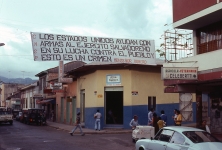
Quote from Monseñor Óscar Romero on U.S. Weapon Assistance to Salvadoran Army (2/2)
"Los Estados Unidos ayudan con armas al ejercito Salvadoreño en su lucha contra el pueblo y esto es un crimen" ~Monseñor Romero. In English, the quote reads "The United States helps the Salvadoran army with arms in its fight against the people, and this is a crime." Monseñor Óscar Romero served as Roman Catholic Archbishop of San Salvador and spoke out against social injustice and violence by the government and encouraged his people to stop carrying out government orders to kill. He was shot and killed while celebrating mass. To the left of the quote is the acronym C. N. S. P., which stands for Consejo Nacional de Seguridad Pública, or in English, "National Council of Public Safety." Archived by Leah Williams. Photographed by David Schwartz, Albright College, 1981.
David Schwartz Collection, Albright College
